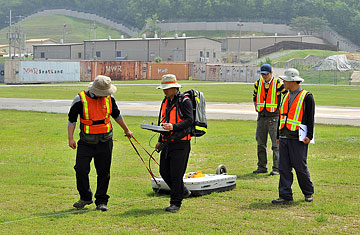
South Korean technicians conduct a ground-penetrating radar survey at Camp Carroll, a U.S. Army base near Waegwan, on June 2, 2011
For a town entangled in a national controversy, Waegwan's streets give off an eerie languor. Ask residents in this South Korean burg about Agent Orange — the code name for a poisonous blend of herbicides that three U.S. Army veterans allege they buried near there in 1978 — and nearly all sigh wearily. The accusation isn't surprising, bemoans Chang Jung-hun, a 69-year-old melon farmer. He says South Korean politicians regularly criticize American military installations for polluting surrounding villages. The latest flare-up, which surfaced in May when the whistle-blowers aired their claims on an Arizona television program, is nothing new.
Chang would prefer that everyone in the firestorm — including the Pentagon, South Korean antimilitary activists and journalists — just leave his neighborhood alone. If outsiders play up the possibility that the defoliant was buried there with scant evidence, he and others told TIME, fruit sales and property prices drop because of contamination fears. "The issue is too sensational, and it is only hurting our town," Chang says. "Too many people are helping their own political agendas at our loss. We'll use our own local representation to get things under control."
This rural town in southeastern South Korea is witnessing the most recent eruption over the U.S. military's possible storage and disposal of Agent Orange more than 30 years ago. On July 25, Steve House, a 54-year-old former U.S. Army heavy-machinery operator, testified before the country's National Assembly that he and his colleagues buried at least 250 drums of Agent Orange at the base, known as Camp Carroll, in 1978. A coalition of activist groups paid for his trip to Seoul; he arrived two months after he and two other veterans brought forward the allegations on a TV-news station in Arizona. Last Thursday, House visited his old base, pointing out a former ditch where he claims the barrels were buried.
Accompanying House on the trip is a former Army engineer battalion captain, 63-year-old Phil Steward. He says he ordered troops to spray 300 to 500 drums of Agent Orange and other chemicals around two other bases in northeastern South Korea, where he was stationed in 1968 and 1969, in part to kill weeds around the soldiers' living quarters. Today both men, who served 10 years apart at separate bases, suffer from diabetes, neuropathy and other maladies they claim were triggered by exposure to the toxin.
The U.S. military, for its part, admits that in the late 1960s, South Korean soldiers hand sprayed 21,000 gal. (79,000 L) of Agent Orange and other herbicides across a southwestern stretch of the DMZ between South and North Korea — and, since 2000, has been doling out benefits to American veterans exposed in that area. But if the allegations further south of the border are true, the Department of Veterans Affairs may have to expand its coverage, compensating ailing veterans like House who didn't work near the DMZ.
As in other countries where it was used, Agent Orange is a touchy topic in South Korea because of the widespread and long-term risks it poses to people's health. The defoliant contains dioxins, toxic compounds linked to 15 serious conditions such as cancers, nerve disorders and birth defects. It's a heated issue that has been playing out for more than three decades — primarily in Asia; once contaminating parts of Thailand, Laos and Cambodia, it gained notoriety when U.S. forces sprayed as much as 18 million gal. (68 million L) of it in Vietnam during the 1960s and early 1970s to defoliate forests, depriving guerrilla soldiers of concealment. About 400,000 Vietnamese have died or been disabled because of exposure, according to the Vietnamese government, while 500,000 children have been born with defects associated with the toxin.
Aside from witnesses' accounts, the evidence so far of an Agent Orange disposal in Camp Carroll is dubious. In mid-June, responding to House's television interview, South Korean and U.S. authorities found small amounts of dioxin in three streams near Camp Carroll. The traces weren't dangerous, and Korean authorities said they do not believe that they come from Agent Orange, though the state investigation team says more comprehensive findings will be released before the end of the summer.
